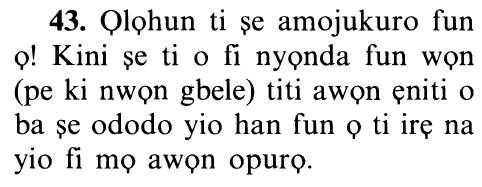9vs43
Select any filter and click on Go! to see results
عَفَا اللّهُ عَنكَ لِمَ أَذِنتَ لَهُمْ حَتَّى يَتَبَيَّنَ لَكَ الَّذِينَ صَدَقُواْ وَتَعْلَمَ الْكَاذِبِينَ
AAafa Allahu AAanka lima athinta lahum hatta yatabayyana laka allatheena sadaqoo wataAAlama alkathibeena
Index Terms
Click to play
Yoruba Translation

Hausa Translation
Allah Ya yãfe maka laifi. Dõmin me ka yi musu izinin zama? Sai waɗanda suka yi gaskiya ssun bayyana a gare ka, kuma ka san maƙaryata.
Asbabu n-Nuzuul (Occasions of Revelation)
(Had it been a near adventure and an easy journey they had followed theeナ) [9:42-47]. Allah then revealed about those hypocrites who stayed behind and did not take part in the Battle of Tabuk (Had it been a near adventure and an easy journey they had followed theeナ). He also revealed (Had they gone forth among you they had added to you naught save troubleナ). This is because when the Messenger of Allah, Allah bless him and give him peace, set forth, he camped his troops at al-Wada メs mountain trail while Abd Allah ibn Ubayy camped his troops at a clear trodden path below the mountain trail of al-Wada. His troops were no less than the troops which were with the Prophet.
When the Messenger of Allah, Allah bless him and give him peace, marched again, Abd Allah ibn Ubayy, the hypocrites and the doubters stayed behind. To consol His Prophet, Allah bless him and give him peace, Allah, exalted is He, revealed (Had they gone forth among you they had added to you naught save troubleナ).
Moderately criticizing the Prophet for allowing the Hypocrites to stay behind
Allah says;
عَفَا اللّهُ عَنكَ لِمَ أَذِنتَ لَهُمْ ...
May Allah forgive you. Why did you grant them leave,
Ibn Abi Hatim recorded that Awn said,
"Have you heard criticism softer than this, starting with forgiveness before criticism,"
Muwarriq Al-Ijli and others said similarly.
Qatadah said,
"Allah criticized him as you read here, then later revealed to him the permission to allow them to lag behind if he wants, in Surah An-Nur,
فَإِذَا اسْتَـْذَنُوكَ لِبَعْضِ شَأْنِهِمْ فَأْذَن لِّمَن شِئْتَ مِنْهُمْ
So if they ask your permission for some affairs of theirs, give permission to whom you will of them.'' (24:62)
Ata' Al-Khurasani said similarly.
Mujahid said,
"This Ayah was revealed about some people who said,
`Ask permission from the Messenger of Allah (to stay behind), and whether he agrees, or disagrees, remain behind!'''
Allah said,
... حَتَّى يَتَبَيَّنَ لَكَ الَّذِينَ صَدَقُواْ ...
...until those who told the truth were manifest to you,
in reference to valid excuses,
... وَتَعْلَمَ الْكَاذِبِينَ ﴿٤٣﴾
and you had known the liars.
Allah says, `Why did you not refuse to give them permission to remain behind when they asked you, so that you know those who truly obey you and the liars, who were intent on remaining behind even if you do not give them permission to do so.
قال ابن أبي حاتم : حدثنا أبي حدثنا أبو حصين بن سليمان الرازي حدثنا سفيان بن عيينة عن مسعر عن عون قال : هل سمعتم بمعاتبة أحسن من هذا ؟ نداء بالعفو قبل المعاتبة فقال عفا الله عنك لم أذنت لهم وكذا قال مورق العجلي وغيره وقال قتادة : عاتبه كما تسمعون ثم أنزل التي في سورة النور فرخص له في أن يأذن لهم إن شاء فقال " فإذا أستأذنوك لبعض شأنهم فائذن لمن شئت منهم " الآية . وكذا روي عن عطاء الخراساني وقال مجاهد نزلت هذه الآية في أناس قالوا استأذنوا رسول الله صلى الله عليه وسلم فإن أذن لكم فاقعدوا وإن لم يأذن لكم فاقعدوا ولهذا قال تعالى " حتى يتبين لك الذين صدقوا " أي في إبداء الأعذار " وتعلم الكاذبين " .
وكان صلى الله عليه وسلم أذن لجماعة في التخلف باجتهاد منه فنزل عتابا له وقدم العفو تطمينا لقلبه "عفا الله عنك لم أذنت لهم" في التخلف وهلا تركتهم, "حتى يتبين لك الذين صدقوا" في العذر "وتعلم الكاذبين" فيه
قيل : هو افتتاح كلام , كما تقول : أصلحك الله وأعزك ورحمك كان كذا وكذا . وعلى هذا التأويل يحسن الوقف على قوله : " عفا الله عنك " , حكاه مكي والمهدوي والنحاس . وأخبره بالعفو قبل الذنب لئلا يطير قلبه فرقا . وقيل : المعنى عفا الله عنك ما كان من ذنبك في أن أذنت لهم , فلا يحسن الوقف على قوله : " عفا الله عنك " على هذا التقدير , حكاه المهدوي واختاره النحاس . ثم قيل : في الإذن قولان : [ الأول ] " لم أذنت لهم " في الخروج معك , وفي خروجهم بلا عدة ونية صادقة فساد . [ الثاني ] - " لم أذنت لهم " في القعود لما اعتلوا بأعذار , ذكرها القشيري قال : وهذا عتاب تلطف إذ قال : " عفا الله عنك " . وكان عليه السلام أذن من غير وحي نزل فيه . قال قتادة وعمرو بن ميمون : ثنتان فعلهما النبي صلى الله عليه وسلم ولم يؤمر بهما : إذنه لطائفة من المنافقين في التخلف عنه ولم يكن له أن يمضي شيئا إلا بوحي وأخذه من الأسارى الفدية فعاتبه الله كما تسمعون . قال بعض العلماء : إنما بدر منه ترك الأولى فقدم الله العفو على الخطاب الذي هو في صورة العتاب .
I'raab - grammatical analysis of the Qur'an
«عَفَا» فعل ماض.
«اللَّهُ» لفظ الجلالة فاعله.
«عَنْكَ» متعلقان بالفعل ، والجملة ابتدائية.
«لِمَ» اللام حرف جر.
«ما» اسم استفهام في محل جر باللام ، والجار والمجرور متعلقان.
«أَذِنْتَ». وحذفت ألف ما لتمييزها عن ما الموصولة.
«حَتَّى» حرف غاية وجر.
«يَتَبَيَّنَ» مضارع منصوب بأن المضمرة بعد حتى ، والمصدر المؤول من أن المضمرة والفعل في محل جر بحتى. والجار والمجرور متعلقان بفعل محذوف.
«لَكَ» متعلقان بالفعل.
«الَّذِينَ» اسم موصول في محل رفع فاعل.
«صَدَقُوا» فعل ماض وفاعل والجملة صلة الموصول.
«وَتَعْلَمَ الْكاذِبِينَ» مضارع ومفعوله وفاعله ضمير مستتر تقديره أنت ، والجملة معطوفة.
